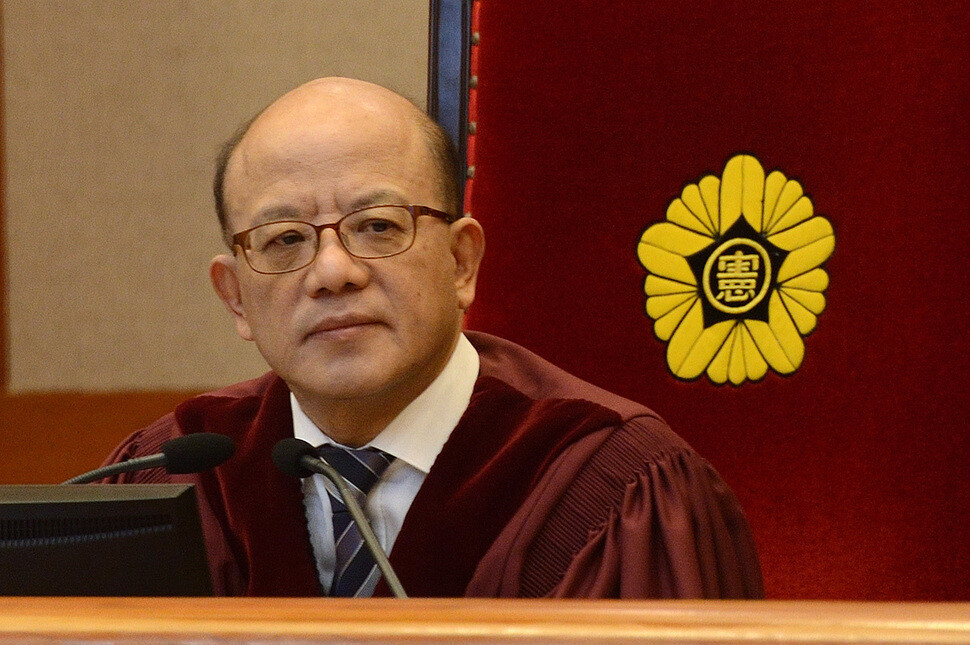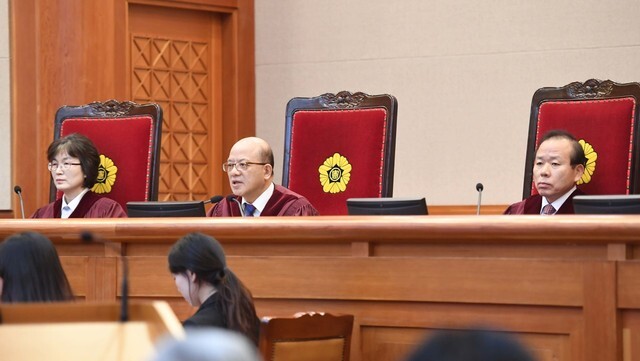hankyoreh
Links to other country sites 다른 나라 사이트 링크
Constitutional Court president resolves to wrap Park’s impeachment trial by March 13

Constitutional Court president Park Han-chul, who finished his term on Jan. 31, said at the ninth session of arguments on Jan. 25 that a decision in the impeachment trial of President Park Geun-hye will need to be made before Mar. 13, when Lee Jung-mi, the senior of the remaining judges, steps down.
With a concrete date now set for the ruling, a presidential election appears likely to be held in late April or early May.
As the trial proceedings began on Jan. 25, Park Han-chul noted, “My term ends in six days, and Justice Lee Jung-mi will see her term ending on Mar. 13.”
“A final decision on this case will need to be pronounced no later than Mar. 13 before any further serious problems with the Court’s composure arise,” he added.
“If the trial proceedings are delayed, there is a very serious risk of grave obstacles to the hearing and decision as the trial proceeds with seven [justices], which is barely enough to achieve a quorum,” Park said.
Park, who has focused on the impeachment trial for the 48 days since the National Assembly’s impeachment vote was submitted on Dec. 9 but finds himself leaving before a conclusion is reached, appears to have made the statement to indicate his resolution to finish it before Lee’s term ends.
Park’s remarks on Jan. 25 went well beyond expectations in and around the court. Many had predicted he would take advantage of the ninth session of arguments - his last before leaving his position on Jan. 31 - to send a message about “resolving the political disruption from the President’s suspension as soon as possible.” Instead, he specified a concrete schedule for the impeachment trial ruling, risking a likely political controversy and backlash.

Park explained that his remarks were intended to prevent “distortion” of the trial from the additional vacancy left when Justice Lee Jung-mi follows him in leaving the court on Mar. 13. The Constitutional Court Act states that a trial quorum requires seven or more Justices to be present, but that an impeachment decision must have the agreement of six or more. Park’s argument appeared to be that while there is no Constitutional issue in terms of the court’s ability to conduct a trial with two of its nine seats vacant, holding a President impeachment trial with only seven Justices - barely exceeding the quorum - could have an effect on the ratio of votes for and against impeachment, and that the decision should therefore be reached before Lee steps down. It also reflects the Constitutional position that the leadership vacuum from the President’s suspension should be ended as quickly as possible.
Many Constitutional scholars say the impeachment trial has an adequate level of “formal fairness.” The decision in the 2004 impeachment trial of then-President Roh Moo-hyun (2003-2008) took 68 days and seven sessions of arguments to be reached. As of Jan. 25, the ninth session of arguments in the Park Geun-hye impeachment trial concluded on the 47th day of the trial, which followed an impeachment vote on Dec. 9. Tenth and eleventh sessions of arguments are scheduled for the first week of February after Park’s team requested a large number of additional witnesses in appeared to be an attempt to buy time. If a decision is reached on Mar. 13, the trial will have lasted 95 days.
“President Park’s side has been complaining about ‘fairness,’ but the court is also concerned about fairness, accepting the adoption of some of the many additional witnesses requested in what appeared to be stalling tactics by her team,” said Korea University law professor Chang Young-soo.
“As complex as the issues may be, a 96-day trial period is not a short time,” Chang added. As its impeachment trial prospect look less and less optimistic, Park’s team has resorted to overt stalling tactics, as with its attempts since mid-January to request numerous additional witnesses. Its objections on Jan. 25 may be the result of political calculations. The day before issuing impolitic remarks bordering on a trial recusation request - including claims that the court was having behind-the-scenes “transactions”
with National Assembly impeachment committee members - the team held an 80-minute meeting with Park. The threat of her legal team quitting en masse is unlikely to pan out without prior permission from Park.
“Questioning of witnesses is only possible with both legal teams present,” said No Hee-beom, an attorney and Constitutional researcher. “If President Park’s team resigns, the court may go through a procedure of giving notice of an appointment period for a new team, in which case the trial could spin its wheels for a week or two.”
Chang Young-soo said the practical arguments “basically seem to be finished already.”
“If [Park’s] legal team resigns en masse, the court could cancel the adoption of the witnesses it requested and close arguments straightaway,” Chang added.
Some Constitutional scholars called Park Han-chul’s actions “inappropriate,” arguing that his nailing down of a date for an impeachment trial decision while the evidence investigation remains incomplete - even if other justices agreed to it - could raise issues of fairness.
By Kim Nam-il, staff reporter
Please direct questions or comments to [english@hani.co.kr]

Editorial・opinion
![[Column] Has Korea, too, crossed the Rubicon on China? [Column] Has Korea, too, crossed the Rubicon on China?](https://flexible.img.hani.co.kr/flexible/normal/500/300/imgdb/original/2024/0419/9317135153409185.jpg) [Column] Has Korea, too, crossed the Rubicon on China?
[Column] Has Korea, too, crossed the Rubicon on China?![[Correspondent’s column] In Japan’s alliance with US, echoes of its past alliances with UK [Correspondent’s column] In Japan’s alliance with US, echoes of its past alliances with UK](https://flexible.img.hani.co.kr/flexible/normal/500/300/imgdb/original/2024/0419/2317135166563519.jpg) [Correspondent’s column] In Japan’s alliance with US, echoes of its past alliances with UK
[Correspondent’s column] In Japan’s alliance with US, echoes of its past alliances with UK- [Editorial] Does Yoon think the Korean public is wrong?
- [Editorial] As it bolsters its alliance with US, Japan must be accountable for past
- [Guest essay] Amending the Constitution is Yoon’s key to leaving office in public’s good graces
- [Editorial] 10 years on, lessons of Sewol tragedy must never be forgotten
- [Column] A death blow to Korea’s prosecutor politics
- [Correspondent’s column] The US and the end of Japanese pacifism
- [Guest essay] How Korea turned its trainee doctors into monsters
- [Guest essay] As someone who helped forge Seoul-Moscow ties, their status today troubles me
Most viewed articles
- 1[Column] The clock is ticking for Korea’s first lady
- 2After 2 months of delayed, denied medical care, Koreans worry worst may be yet to come
- 3Hong Se-hwa, voice for tolerance whose memoir of exile touched a chord, dies at 76
- 4Samsung barricades office as unionized workers strike for better conditions
- 5[Column] Has Korea, too, crossed the Rubicon on China?
- 6US overtakes China as Korea’s top export market, prompting trade sanction jitters
- 7[Editorial] As it bolsters its alliance with US, Japan must be accountable for past
- 8[Correspondent’s column] In Japan’s alliance with US, echoes of its past alliances with UK
- 9All eyes on Xiaomi after it pulls off EV that Apple couldn’t
- 10[Guest essay] How Korea turned its trainee doctors into monsters